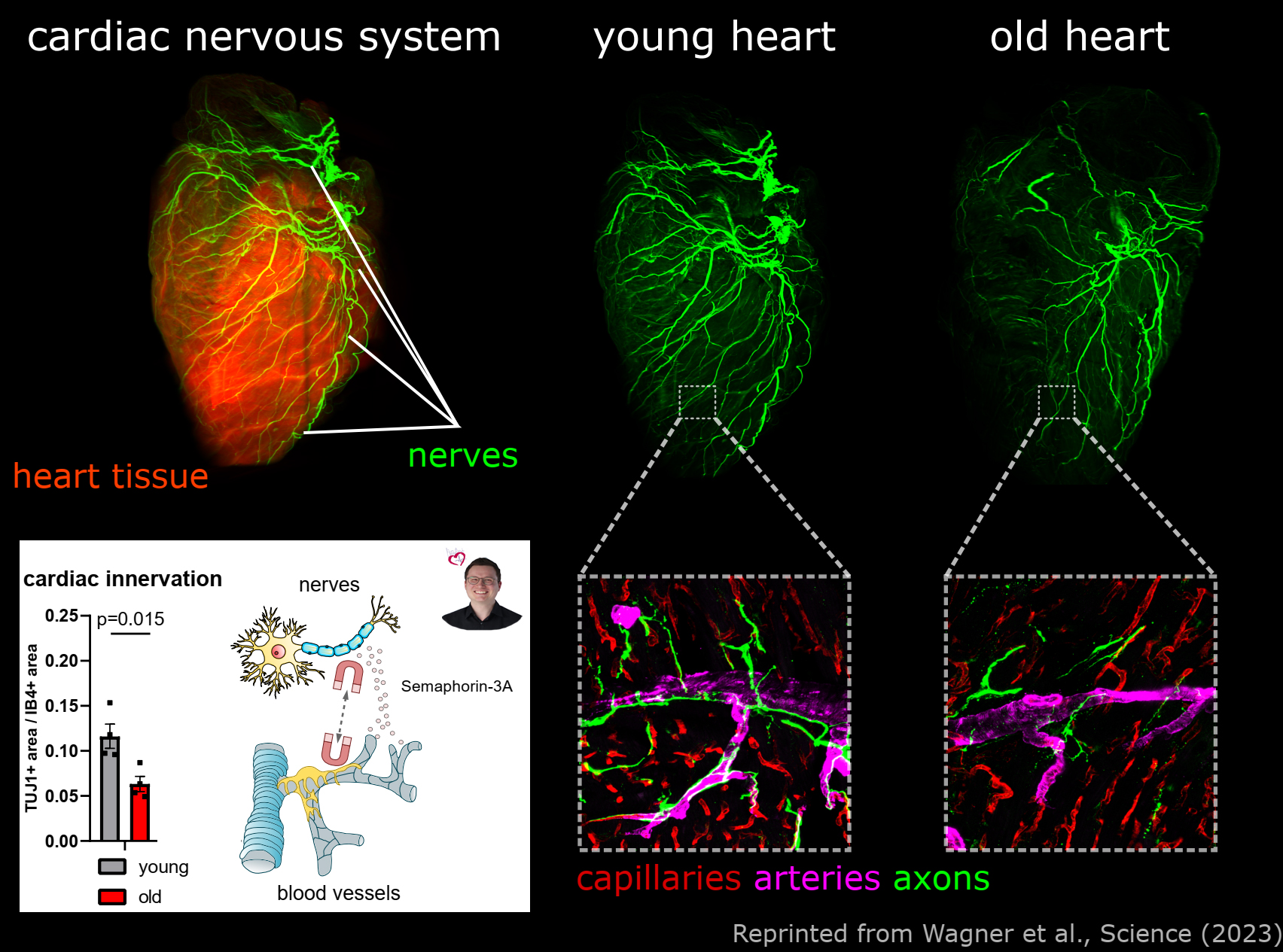When the heart loses its nerve: New findings on the interaction of nerves and hearts during aging
On 25 August 2023 ICR Postdoc Julian Wagner published a new study in the prestigious scientific journal Science on the interaction of nerves and hearts during aging. The study „Ageing impairs the neuro-vascular interface in the heart“ now demonstrates for the first time, that nerves regress at the interface of blood vessels and the nervous system in the left ventricle during ageing. This makes it increasingly more difficult for the heart to respond to stress situations with the heart rate.
It is primarily the left ventricle of the heart that pumps blood through the body. In the course of life, it becomes larger and can sometimes scar, which impairs pumping function. While it has been known for some time that the vessels supplying the heart with blood decline in function with age, it was previously unknown whether the interaction with the nerves supplying the heart could also be influenced by the aging process. Now our team has been able to demonstrate that the nerves in old hearts regress. This reaction is triggered by the fact that blood vessels in the heart, with increasing age, release the messenger substance semaphorin-3A into their environment, which inhibits the growth and sprouting of nerve cells in the heart muscle tissue. The consequence of the diminished nerves in the heart itself is that the heart muscle cells are no longer „informed“ by impulses from the nerve cells, for example by a faster heartbeat to ensure an increased demand for oxygen supply to the body under stress. The heart thus loses some of its autonomic control of heart rate, with potentially adverse long-term consequences for survival as well, clinical observations suggest.
A central role for the decline of nerve cells in the heart seems to be played by aging, so-called ’senescent‘ cells of the vascular system. If the number of these ’senescent‘ cells is experimentally prevented by targeted drugs (so-called senolytics), the nerve cells grow again and the heart regains autonomous control over pulse regulation. However, the extent to which these treatment approaches can be transferred to humans remains to be seen in future studies.
With our findings on the disturbed interaction of blood and nerve cells in the heart tissue, which is associated with increasing age, we are focusing on an aspect of heart research that has so far been largely ignored. This research represents an important step toward better understanding the complex mechanisms underlying heart disease and could potentially open up new approaches to the prevention and treatment of cardiovascular disease.
Link to the paper: https://www.science.org/doi/full/10.1126/science.ade4961
Citation: Wagner JUG, Tombor LS, Malacarne PF, Kettenhausen LM, Panthel J, Kujundzic H, Manickam N, Schmitz K, Cipca M, Stilz KA, Fischer A, Muhly-Reinholz M, Abplanalp WT, John D, Mohanta SK, Weber C, Habenicht AJR, Buchmann GK, Angendohr S, Amin E, Scherschel K, Klöcker N, Kelm M, Schüttler D, Clauss S, Günther S, Boettger T, Braun T, Bär C, Pham MD, Krishnan J, Hille S, Müller OJ, Bozoglu T, Kupatt C, Nardini E, Osmanagic-Myers S, Meyer C, Zeiher AM, Brandes RP, Luxán G, Dimmeler S. Aging impairs the neurovascular interface in the heart. Science. 2023 Aug 25;381(6660):897-906. doi: 10.1126/science.ade4961. Epub 2023 Aug 24. PMID: 37616346.

